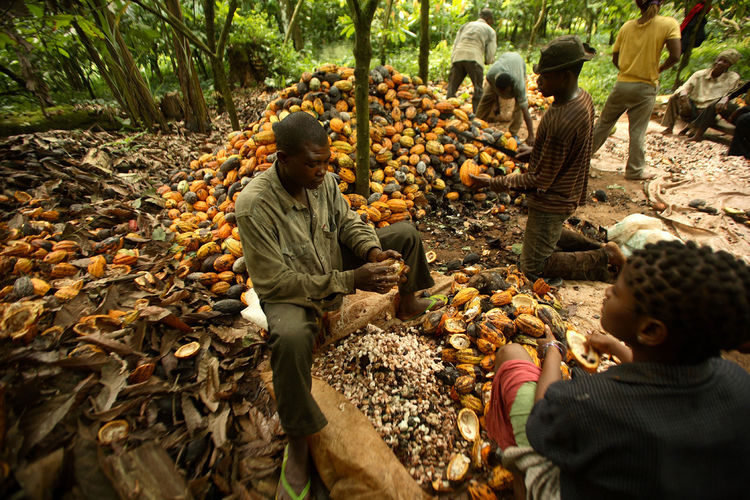- Boost for Cocoa Entrepreneurs
A new cocoa economy may be on the horizon as an international organisation, German International Cooperation (GIZ), is teaching agro entrepreneurs to explore new income possibilities across the cocoa industry. DANIEL ESSIET reports.
An international organisation, German International Cooperation (GIZ), is giving agro entrepreneurs the tools they need to turn cocoa production into a viable business.
With so much money declared by international chocolate makers yearly, the organisation is determined to lift smallholder farmers out of poverty.
Cocoa production accounts for 10 percent of Nigeria’s Gross Domestic Product (GDP) and supports 10 million people, which translates to about 30 per cent of Nigeria ’s population.
GTZ’s long-term aim is to help the farmers become independent members of an agricultural “value chain”.
Across Ondo State, 18,648 cocoa farmers, made up of 7,449 women and 11,199 men in 648 groups across 10 local government areas, have received the Farmer Business School (FBS) training supported by the German Development Cooperation-Sustainable Smallholder Agribusiness (GIZ-SSAB) programme. The core curriculum covers business, good agricultural practice and cooperative skills.
According to GIZ Country Director, Dr. Thomas Kirsch, “the FBS has succeeded in changing the orientation of farmers, who now see farming as a business enterprise that needs to be well planned, to reap the highest returns from the enterprise”.
Farmers have also recorded increase income, production and yield, and group sales and purchases of input.
Speaking at the inauguration of the FBS Farmers Cooperative Multipurpose Union in Akure, Kirsch said the partnership between the organisation and the Federal Ministry of Agriculture and Rural Development has brought business skills training to 89,040 cocoa farmers in six states – Abia, Cross River, Edo, Ekiti, Ondo and Osun.
The trained farmers are coordinating the groups in each local government of the states. The apex body known as Ondo State FBS Farmers’ Cooperative Multipurpose Union Ltd has been inaugurated.
Ondo State FBS Farmers Cooperative Multipurpose Union Chairman, High Chief Ebenezer Adenisimi, said the FBS training had helped farmers to adopt business skills in their farms.
These, he noted, include record keeping of input and output, savings in banks, group purchase of farm input in large scale, group sales of farm produce to off-takers, diversification of production to generate additional income, organising and registering of groups as cooperative societies, accessing financial services from banks, keeping of farm records and putting to use good agricultural practices.
An FBS-trained farmer and leader of Igba-Otun FBS Cooperative Society, Awopeju Village, Mr. Julius Urom, noted that the group has invested in cocoa nursery, fish farming, poultry and piggery to augment their cocoa income.
He said 23 members of the society, who invested in the business with about N20,000, have increased their income base to over N100,000 inone year.
Ondo State Governor, Mr. Rotimi Akeredolu, lauded GIZ for the training which, according to him, led to the formation of the Cooperative Union.
He said: “The farmers’ organisation we are about to inaugurate is a product of intervention from a Development Partner – GIZ, an outfit of the Federal Ministry of Economic Co-operation and Development of Germany.”
The governor, who was represented by his deputy, Mr. Agboola Ajayi, praised the farmers for forming the cooperative society.
This, according to the governor, was “to enable them own the programme and become self-sustaining financially as producer groups and become less dependent on the government”.
The governor announced the donation of N25.75 million for the expansion of the Farmers Business School programme.
He said this was in fulfillment of his pledge to “work with genuine stakeholders in the development of the state”.
The Regional Director, GIZ-SSAB Programme, Dr. Annemarie Matthess, said FBS is innovative. “It fosters the business mind and skills of agricultural producers, be it men or women. After Farmer Business School, the majority of farmer graduates invest in cocoa and food production for more income,” she noted.
Matthess, represented by Ayo Akinola, a Senior Technical Advisor to GIZ-SSAB, said the FBS’s success story in five cocoa producing countries, including Nigeria, informed the expansion of FBS into 15 African countries to reach cocoa, coffee, cassava, rice, cotton, pineapple, milk, olives and tomatoes producers.
She added that the registration of new cooperatives and multipurpose cooperatives unions is “a particular achievement in Nigeria compared to our other partner-countries”.
She noted that of the 95 new multipurpose cooperatives registered between 2011 and 2016 in Ondo, 84 have embedded the acronym “FBS” in their names to show where they come from and what drives them;, adding that networking among the cooperatives and support provided by the state ADP led to the registration of the FBS Farmers Cooperative Multipurpose Union Ltd.

 Naira4 weeks ago
Naira4 weeks ago


 Naira4 weeks ago
Naira4 weeks ago


 Naira3 weeks ago
Naira3 weeks ago


 News4 weeks ago
News4 weeks ago
 Travel4 weeks ago
Travel4 weeks ago




 Naira4 weeks ago
Naira4 weeks ago


 Jobs3 weeks ago
Jobs3 weeks ago
 Naira3 weeks ago
Naira3 weeks ago






















